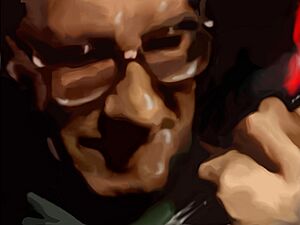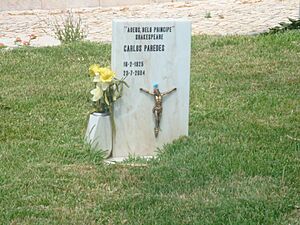Carlos Paredes facts for kids
Quick facts for kids
Carlos Paredes
|
|
|---|---|
 |
|
| Background information | |
| Born | 16 February 1925, Coimbra, Portugal |
| Died | 23 July 2004 (aged 79) Lisbon, Portugal |
| Genres | Fado, Coimbra fado, classical |
| Instruments |
|
| Years active | 1939–1993 |
| Labels |
|
Carlos Paredes ComSE (born February 16, 1925 – died July 23, 2004) was an amazing Portuguese guitar player and composer. Many people think he was one of the best Portuguese guitar players ever!
He was born in Coimbra, Portugal, into a family where many people played the guitar. His father, Artur Paredes, taught him how to play. Carlos wrote music for many movies and plays. One of his most famous songs is "Canção Verde Anos" from the film Os Verdes Anos (1963). He released his own music and performed all over the world.
Besides music, Carlos Paredes also worked for the government for most of his life. In 1958, during a time when Portugal had a strict government, he was put in prison for 18 months. This happened because he joined a political group that was not allowed at the time.
About Carlos Paredes
His Early Life
Carlos Paredes was born in Coimbra on February 16, 1925. His father, Artur Paredes, was a famous Portuguese guitar player. Carlos's grandfather, great-uncle, and great-grandfather also played the guitar. It was a family tradition!
Around 1934, when Carlos was 9, his family moved to Lisbon. He went to school there and even took violin and piano lessons. He started playing guitar when he was only 4 years old, learning from his dad.
By age 9, Carlos was already playing guitar with his father at concerts. When he was 14, Carlos and Artur Paredes started a weekly radio show. It was on Portugal's national radio station.
In 1949, Carlos started working for the government. He worked in the X-ray archive at the Hospital de São José in Lisbon. He kept this job for many years, even while he was a famous musician. He retired from it in 1986.
His Time in Prison
Carlos Paredes grew up when Portugal had a strict government called the Estado Novo. He quietly disagreed with this government. In 1958, he joined a political group that was not allowed in Portugal.
On September 26, 1958, he was arrested at his job. He was accused of being part of this illegal group. Carlos was kept in prison for 18 months. While he was in prison, he kept composing music in his head. Some people in prison thought he was going crazy because he would pretend to play the guitar in his cell. But he was actually creating new songs!
After he was released, he couldn't go back to his hospital job right away. He worked in medical sales for a few years.
Later, after a big change in Portugal's government in 1974 (called the Carnation Revolution), Carlos was seen as a hero. This was because he had been a political prisoner. But he didn't like being called a hero. He said others suffered more than him. He got his old job back at the hospital after the revolution.
Carlos Paredes remained a member of the political group he joined until he passed away.
His Music Career
Music in the 1950s and 1960s
Carlos Paredes released his first music in 1957. It was an EP (a short album). He played with Fernando Alvim on the classical guitar. They played music together for over 20 years!
In the 1960s, Carlos wrote music for many Portuguese films. He composed the music for the 1963 film Os Verdes Anos. His song "Canção Verdes Anos" from this movie became one of his most famous pieces. He also wrote music for Fado Corrido (1964) and Mudar de Vida (1966). He also contributed to several short films.
In 1967, his first full album, Guitarra Portuguesa, came out. That same year, he played with the famous fado singer Amália Rodrigues in Paris. Amália was very impressed and wanted him to join her touring band. But Carlos said no. He remembered his father's advice: "If you want to be a solo player, you must not play for anyone else." Even so, they stayed good friends for life.
He released more EPs in 1968, including Porto Santo and Divertimento.
Music in the 1970s
In 1970, Carlos released an album called Meu País with Cecília de Melo. In 1971, his second solo album, Movimento Perpétuo, was released.
After the Carnation Revolution in 1974, Carlos toured Europe. He played at many events, including some for the political group he belonged to. His music was even used on TV during Portugal's first democratic elections in 1975. That year, he released the album É Preciso um País with poet Manuel Alegre.
Carlos started working on a new album around 1975. But he wasn't happy with the recordings. Some of these songs were later released in East Germany in 1980 as O Oiro e o Trigo.
Music in the 1980s
In 1982, a ballet group used his song "Danças Para Uma Guitarra" for a dance.
His live album Concerto em Frankfurt came out in 1983. It was recorded at a concert in Frankfurt Opera.
In 1986, he released Invenções Livres with composer António Victorino de Almeida.
He released two more solo albums: Espelho de Sons in 1987, which was very popular, and Asas Sobre o Mundo in 1989.
Music in the 1990s
In 1990, Carlos Paredes released an album called Dialogues with American jazz musician Charlie Haden.
His very last concert was in October 1993 in Lisbon. He played with Luísa Amaro.
After he stopped performing, two more albums of his music were released. These albums contained songs he had recorded earlier but had not released. They were Na Corrente (1996) and Canção para Titi (2000).
His Illness and Death
In December 1993, Carlos Paredes was diagnosed with a disease called myelopathy. This illness made it impossible for him to play the guitar anymore. He had to stop his music career. He lived in a special care home in Lisbon until he passed away.
Carlos Paredes died on July 23, 2004, in Lisbon. After he died, the Portuguese government declared a day of national mourning to honor him. He is buried in the Prazeres Cemetery in Lisbon.

His Personal Life
Carlos Paredes was married twice and had six children.
People who knew him remember him for being very humble. He didn't want to make all his money from music. He kept his job at the hospital until he was 61. He said he "loved music too much to live from it."
His Legacy
Carlos Paredes is known as one of the greatest Portuguese guitarists ever. People often call him "The master of the Portuguese guitar" or "The man with a thousand fingers." The famous fado singer Amália Rodrigues once said he was "a national monument."
Several buildings in Portugal are named after him. There is also an award for Portuguese musicians called the Carlos Paredes Prize. It has been given out since 2003.
Awards and Honors
In 1992, the President of Portugal gave Carlos Paredes a special honor. He was made a Commander of the Military Order of Saint James of the Sword.
Discography
Studio Albums
- Guitarra Portuguesa (Portuguese Guitar) (1967)
- Movimento Perpétuo (Perpetual Movement) (1971)
- O Oiro e o Trigo (1980, released in East Germany)
- Espelho de Sons (Mirror of Sounds) (1987)
- Asas Sobre o Mundo (Wings Over the World) (1989)
- Na Corrente (In the Current) (1996)
- Canção para Titi: Os Inéditos 1993 (Song for Titi: The Unreleased 1993) (2000)
Extended Plays
- Carlos Paredes (1957)
- Guitarradas Sob o Tema do Filme "Verdes Anos" (Guitar Pieces on the Theme of the Film "Green Years") (1963)
- Romance Nº 2 (Romance No. 2) (1968)
- Fantasia (Fantasy) (1968)
- Porto Santo (1968)
- António Marinheiro - Tema da Peça (António Marinheiro - Play Theme) (1972)
Collaboration Albums
- Meu País (My Country) (1970), with Cecília Melo
- É Preciso um País (A Country is Needed) (1975), with Manuel Alegre
- Invenções Livres (Free Inventions) (1986), with António Vitorino d'Almeida
- Dialogues (1990), with Charlie Haden
Live Albums
- Concerto em Frankfurt (Concert in Frankfurt) (1983)
Compilation Albums
- Meister Der Portugiesischen Gitarre (Master of the Portuguese Guitar) (1977, released in East Germany)
See also
- Coimbra fado
- Portuguese guitar
 | Jessica Watkins |
 | Robert Henry Lawrence Jr. |
 | Mae Jemison |
 | Sian Proctor |
 | Guion Bluford |

